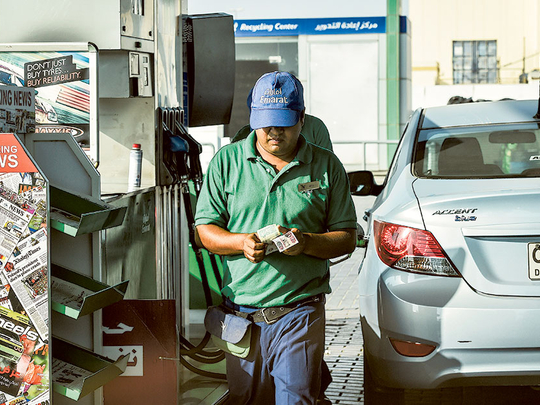
Abu Dhabi: New petrol prices for the month of September dropped between 8 and 9 per cent compared to August, the Ministry of Energy announced on Thursday. New prices are Super (Octane 98 petrol) at Dh2.07 per litre; Special (Octane 95 petrol) Dh1.96 per litre; E Plus (Octane 91 petrol) Dh1.89 per litre. Diesel price has been fixed at Dh1.86 per litre, down almost 9 per cent from August.
The new prices will come into effect starting Tuesday, September 1, 2015, the ministry stated. Last month, the Ministry of Energy increased petrol prices by 24 per cent and reduced diesel prices by 29 per cent for August [over July].
“The prices are based on the average global prices for diesel and gasoline with the addition of operating costs and profit margins of the distributing companies. The Fuel Price Committee will next meet on September 28 to agree on the prices for the month of October,” Dr Matar Al Nyadi, Undersecretary, Ministry of Energy, said in a statement. “We are monitoring prices month to month to decide about the prices. So far, we have got positive feedback on prices.”
The announcement comes as oil prices tumble across the globe. From a peak of $115 (Dh422.39) in June last year, oil prices reduced to less than $45 this week.
The fuel price committee took into account average international prices in deciding the fuel prices for the September.
Chaired by the Undersecretary of the Ministry of the Energy, the committee includes the undersecretary of the Ministry of Finance, the CEO of Adnoc Distribution, and the CEO of Emirates National Oil Company (Enoc).
According to the Ministry of Energy, the decision is aimed at supporting the national economy, lowering fuel consumption, protecting the environment and preserving national resources.
Credit ratings agency Fitch said pre-tax energy subsidies in the UAE will amount to $12.64 billion, or 2.87 per cent of the GDP (gross domestic product), in 2015.
Fitch said the successful implementation in the UAE, while oil prices are low, could increase public acceptance of subsidy reform elsewhere in the region, boosting the prospects for reform.
Paul Gamble, a Senior Director at Fitch, said deregulation of fuel prices will generate budgetary savings for the government, which are useful in the lower oil price environment.
“Perhaps more importantly, it should encourage more efficient use of fuel and energy consumption, and potentially allow greater exports, which are more lucrative than domestic sales,” he told Gulf News.
“Countries throughout the region are looking at lowering their spending on subsidies, not limited to those covering fuel. It is therefore seems likely that other counties will follow the UAE’s lead.”
In a landmark decision, the Ministry of Energy deregulated fuel prices to support the national economy, lower fuel consumption, protect the environment and preserve national resources.
The transport sector was responsible for 22 per cent of the total greenhouse emissions in the UAE in 2013 amounting to 44.6 million tons of carbon dioxide.












